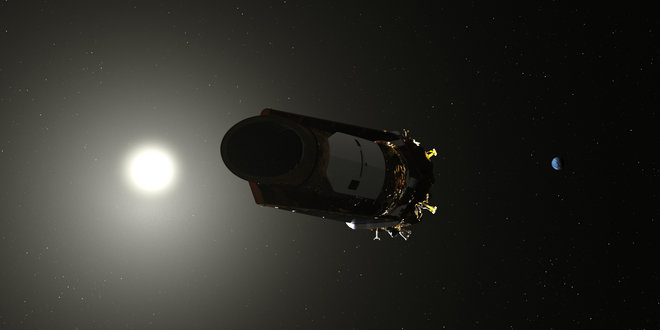After a series of problems caused by depleted fuel, engineers took the decision to power down the floating telescope. Doing so now will ensure it stays in a stable orbit and is far enough away from Earth, they said.
The end of Kepler’s mission brings to a close scientific work that has led to the discovery of thousands of exoplanets, or worlds orbiting stars other than our Sun.
Many of those are promising candidates for supporting life, and the telescope has spotted a number of planets that have been called “Earth 2.0”.
It also showed these promising planets were far more common than scientists had previously thought, vastly increasing optimism alien life could be found in the coming decades.
Some 20 to 50 of the stars in the night sky are orbited by rocky planets similar in size to Earth, it showed.
In all it discovered more than 2,600 planets orbiting other stars. Work on many of them is still ongoing.
Now Nasa says planet-hunting work will be passed on to other spacecraft. But many of Nasa’s other space telescopes are also getting old, and the James Webb Space Telescope set to replace Kepler has been significantly delayed.
Kepler has already lasted much longer than expected when it was launched nearly 10 years ago. It had been so successful that it continued on another mission known as K2, as scientists continued its work for many more years than planned.
“As Nasa's first planet-hunting mission, Kepler has wildly exceeded all our expectations and paved the way for our exploration and search for life in the solar system and beyond,” said Thomas Zurbuchen, associate administrator of Nasa's Science Mission Directorate in Washington.
“Not only did it show us how many planets could be out there, it sparked an entirely new and robust field of research that has taken the science community by storm. Its discoveries have shed a new light on our place in the universe, and illuminated the tantalizing mysteries and possibilities among the stars.”
The Kepler Space Telescope was blasted far beyond the Earth and remained in space looking out for distant stars. When it spotted one, it could watch for the brief dips in those suns’ light that happens when a planet moves in front – and by examining the intensity and regularity of those dips, scientists could understand the makeup of planets many light years away.
The discoveries by Kepler will continue to be worked on in the coming years, and scientists still have much to learn about the planets they found.
“When we started conceiving this mission 35 years ago we didn't know of a single planet outside our solar system,” said the Kepler mission's founding principal investigator, William Borucki, now retired from Nasa’s Ames Research Centre in California’s Silicon Valley.
“Now that we know planets are everywhere, Kepler has set us on a new course that's full of promise for future generations to explore our galaxy.”
Kepler was launched in 2009, using cutting edge techniques to survey the sky. Four years into the mission, it ran into problems – but engineers devised a fix that kicked off the mission known as K2 and allowed the telescope to continue far longer than expected.
“The Kepler mission was based on a very innovative design. It was an extremely clever approach to doing this kind of science,” said Leslie Livesay, director for astronomy and physics at Nasa’s Jet Propulsion Laboratory, who served as Kepler project manager during mission development.
“There were definitely challenges, but Kepler had an extremely talented team of scientists and engineers who overcame them.”
Nasa kept pushing Kepler even as it was clear that its fuel reserves were running out. Data has only recently been downloaded and will be explored alongside new data generated from sources including the Transiting Exoplanet Survey Satellite, Nasa’s newest planet hunter which launched in April.
“We know the spacecraft's retirement isn't the end of Kepler's discoveries,” said Jessie Dotson, Kepler's project scientist at Nasa’s Ames Research Centre. “I'm excited about the diverse discoveries that are yet to come from our data and how future missions will build upon Kepler's results.”
The Independent
More about: NASA
















































